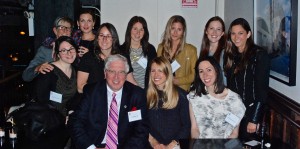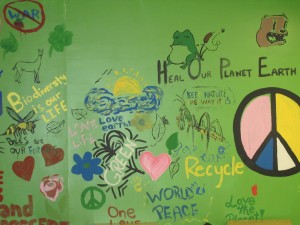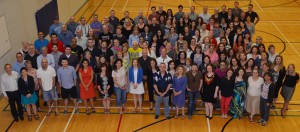 One unique aspect of LCC is that for most students, being part of our community is literally a “cradle to grave” experience. Whether our students’ “cradle” begins in kindergarten or grade 7, by the time they graduate, they will have had made many lifelong friends and they will have shared many special experiences together – both in the classroom and beyond in our co-curricular programmes. The friendships and connections to school will also live well beyond graduation.
One unique aspect of LCC is that for most students, being part of our community is literally a “cradle to grave” experience. Whether our students’ “cradle” begins in kindergarten or grade 7, by the time they graduate, they will have had made many lifelong friends and they will have shared many special experiences together – both in the classroom and beyond in our co-curricular programmes. The friendships and connections to school will also live well beyond graduation.
As Headmaster, I connect frequently with LCC alumni across Canada, the United States and the UK. You might wonder why we bother. We see the practical value of our “cradle-to-grave” approach and the bonding between grads that develops many years beyond graduation. In addition to me, committed people in our Advancement Office are constantly in touch with grads. Mr. LLano is our “Director of Alumni Engagement,” and he is assisted by our Alumni Ambassador and former Assistant Head, Vic Badian. Another former Assistant Head, Mrs. Gendron is also in the mix, reaching out to young women, to help solidify their valuable connections to the school.
Every fall our annual alumni reunion/homecoming dinner brings together anniversary classes, celebrating 10 to 50 years. We offer alumni special hockey and basketball leagues on campus throughout the winter and sponsor a myriad of special social events that keep a lot of alumni connected.
We also have an extensive alumni outreach programme in cities across Canada, the United States and England. We recently hosted receptions in New York, Boston and Ottawa. I am pleased to report that our alumni network is strong, with very healthy turnouts in each city. It is very satisfying to see committed alumni from as far back as the 40s and 50s alongside much younger grads who are studying at university or who have recently entered the workforce, with all the challenges that brings. The older alumni come to these events determined to seek out young LCC grads who they want to mentor and assist. The younger graduates appreciate the opportunity for guidance and support in navigating their new careers under the common bond of sharing learning experiences at the same school – a lifetime bond.
In cities like New York, all of the young LCC grads are attempting to come to terms with a very competitive work environment and the reality of living in small and expensive shoebox apartments. So personal connections, guidance and career advice do matter. I am pleased to say that the courage, creativity and energy of our younger alumni are palpable at all LCC receptions.
We also recently held our annual Career Day and many LCC alumni came to speak to students about their studies or careers and offer help as mentors. A woman from Youth Employment Services Montreal opened Career Day by outlining popular trends in jobs – and she repeated frequently that our students need to be proactive in seeking personal “coffee meetings” with people in fields of interest to them. We understand that having the courage to do that can be a bit daunting, so that’s why our alumni office is there to support and develop personal connections between students, young graduates and a lot of willing established LCC alumni mentors who actually want to have coffee, tea and productive dialogue.
Mr. LLano and I look forward to connecting our students to mentors even before graduation, which will come quicker than you think. Don’t forget our philosophy, “cradle to grave”! – Chris Shannon, Headmaster

 A book by American scientist, Rachel Carson, entitled Silent Spring, was published in 1962 and literally changed the world. I always associate that book and its subsequent impact with the birth of the modern environmental movement. It identified significant health hazards for birds and humans resulting from the wide use of pesticides. Essentially, it laid the groundwork for the eventual banning of a harmful chemical called DDT. In the late 1960s, along with the anti-nuclear movement, the ecological movement became a political force for the first time.
A book by American scientist, Rachel Carson, entitled Silent Spring, was published in 1962 and literally changed the world. I always associate that book and its subsequent impact with the birth of the modern environmental movement. It identified significant health hazards for birds and humans resulting from the wide use of pesticides. Essentially, it laid the groundwork for the eventual banning of a harmful chemical called DDT. In the late 1960s, along with the anti-nuclear movement, the ecological movement became a political force for the first time. Exactly five years ago, our Senior Band visited Boston, and completed a music workshop at Harvard University with Thomas Everett, Director of Harvard University Bands. Following the musical session, Mr. Everett took the time to write me a personal letter that was very complimentary of our young musicians and teachers. Here’s what he said:
Exactly five years ago, our Senior Band visited Boston, and completed a music workshop at Harvard University with Thomas Everett, Director of Harvard University Bands. Following the musical session, Mr. Everett took the time to write me a personal letter that was very complimentary of our young musicians and teachers. Here’s what he said:



 Last week, we all heard the terrible news about the tragic death of a grade 9 student at one of Montreal’s independent schools. On behalf of our entire LCC school community, I immediately sent condolences to the head of school and expressed our collective sadness and sense of solidarity.
Last week, we all heard the terrible news about the tragic death of a grade 9 student at one of Montreal’s independent schools. On behalf of our entire LCC school community, I immediately sent condolences to the head of school and expressed our collective sadness and sense of solidarity.